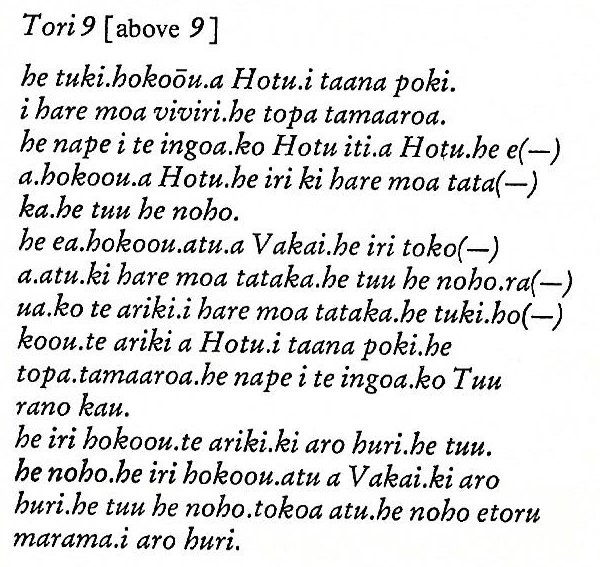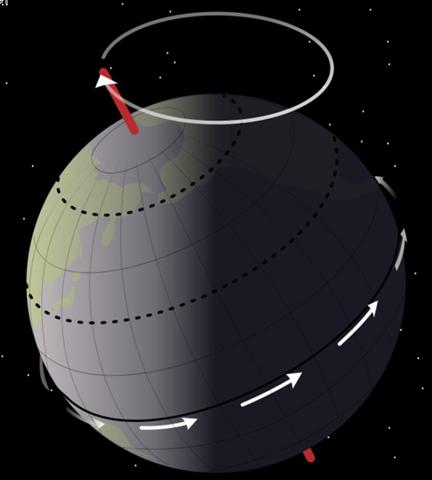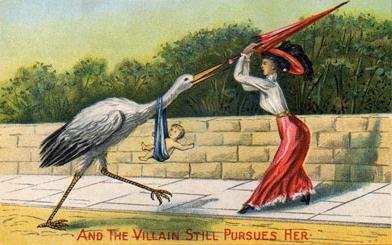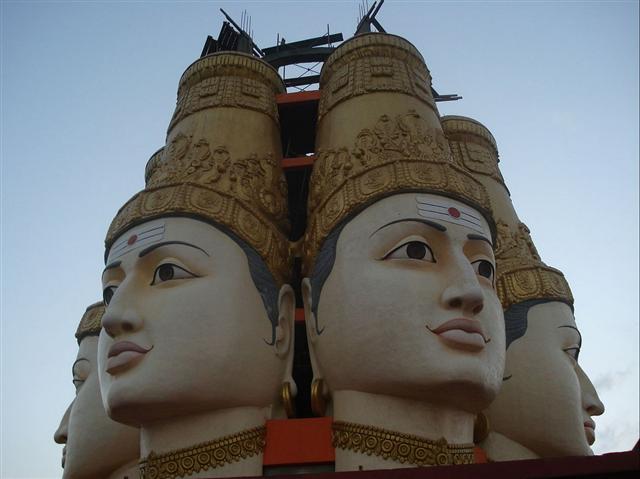
|
Tori 1
E:1001 |
|
10 lines of text relating to
Oroi. |
|
he e(a) hokoou atu a Vakai.he oho.he oo.ki roto |
Again Vakai arose,
went, and entered into the house of King Hotu,
into (the house) Hare Moa Viviri. |
|
ki te hare.o te ariki a Hotu.i hare moa
viviri. |
|
he tuki hokoou te ariki a Hotu.he tupu.
i te iva |
Again Hotu begot (a
child). It grew [he
tupu] for nine months [i
te iva o te marama] and then a boy
was born [he
topa tamaaroa]. He was given the name
[he nape i te
ingoa] Tuu A Hotu Iti (crossed out.
ko te mata iti 'the small eye', wordplay
'the small tribe') A Hotu. |
|
o te marama.he topa
tamaaroa.he nape i te ingoa. |
ko Tuu a hotu iti.
(Crossed out:
ko te mata iti). a Hotu. |
| ... The element
viri
shows that the primal sense is that of causing a
motion in rotation ...

 |
|
E:1002 -
1005, E: 4 - 8 |
|
Tori 9
E:
9 |
| he tuki.hokoōu.a
Hotu.i taana poki. |
Again Hotu begot [he
tuki] a child [poki] in Hare
Moa Viviri. A boy was born [he topa tamaaroa],
and he was given the name [he nape i te ingoa]
Hotu Iti A Hotu. |
| i hare moa viviri.he topa
tamaaroa. |
| he nape i te ingoa.ko Hotu
iti.a Hotu.he e(-) |
| P Pau.: tukituki,
to strike, to pound, to grind. |
| a.hokoou.a Hotu.he iri ki
hare moa tata(-) |
Again Horu arose [he
ea.hokoou.a Hotu], went up to Hare Moa
Tataka [he iri ki hare moa tataka],
arrived, and stayed there [he tuu.he noho]. |
| ka.he
tuu.he noho. |
|
... There is a couple residing in one place
named Kui and Fakataka [Creating a
Circle]. After the couple stay together for a
while Fakataka is pregnant. So they go
away because they wish to go to another place -
they go. The canoe goes and goes, the wind
roars, the sea churns, the canoe sinks. Kui
expires while Fakataka swims.
Fakataka swims and swims, reaching another
land. She goes there and stays on the upraised
reef in the freshwater pools on the reef, and
there delivers her child, a boy child ...
Vai tagata, semen, sperm (also:
takatea). Churchill.
Vari. 1.
Menstruation, period (also: tiko). 2. To
tack, to veer (nautical); ku-vari-mai-á te
miro, the boat arrives, have veered [around
Rano Kau]. Vanaga. About, circumference,
to turn in a circle; hakavari, pliant, to
bend, square; varivari, about, to go
around; vavari, a garland; varikapau,
circumference, to surround, a compass, to
admire; hiriga varikapau, to go in a
ring; pa varikapau, to close in;
varitakataka (vari-taka 3) to
surround. Churchill. Pau.: Vari, marsh,
mire, dirt. Ta.: vari, dirt, mud. Rar.:
vari, mud. Churchill. Mgv.: Vari,
paste well diluted. Mq.: vaivai, to
dilute, to thin. Ha.: waliwali, soft,
pasty. Churchill.
 |
| he ea.hokoou.atu.a Vakai.he
iri toko(-) |
Vakai arose again,
also went up to Hare Moa Tataka, arrived, and
lived with the king in Hare Moa Tataka. |
| a atu.ki hare moa tataka.he
tuu he noho.ra(-) |
| ua.ko te ariki.i hare moa
tataka.he tuki.ho(-) |
| koou.te ariki a Hotu.i taana
poki.he |
Again King Hotu
begot a child [he tuki.hokoou.te ariki a
Hotu.i taana poki]. A boy was born [he
topa.tamaaroa], and he was given the name
Tuu Rano Kau. |
| topa.tamaaroa.he nape i te
ingoa.ko Tuu |
| rano kau. |
| he iri hokoou.te ariki.ki
aro
huri.he tuu. |
After this, the king
went up to Aro Huri, arrived, and stayed there.
Vakai also went up to Aro Huri, arrived, and
stayed there. |
| he noho.he iri hokoou.atu a
Vakai.ki aro |
| huri.he tuu he noho.tokoa
atu.he noho etoru |
They lived in Aro
Huri for three months. |
| marama.i
aro huri. |
| Aro. Face,
front, side (of a figure); ki te aro o ...,
to the front of ... Vanaga. Presence, body,
frontispiece; ki te aro, face to face. P
Pau.: aroga, the visage; ki te aroga,
opposite. Mgv.: aro, presence, before;
i te aro, in the presence of. Mq.: aó,
face, in the presence of, before. Ta.: aro,
face, front, presence, view. It is probable that
more than one word is confounded in alo.
The significations which appear in Southeast
Polynesia are most likely derived from a
Tongafiti alo and do not appear in
Nuclear Polynesia. The alo belly and
alo chief which do occur in Nuclear
Polynesia are also probably Tongafiti, for in
Samoa and Tonga they are honorific and applied
only to folk of rank, a good indication of
borrowing by the Proto-Samoans from Tongafiti
masters. Churchill. In the Hawaiian group, the
western portion or side of an island was called
'the front', ke alo, of the land, and the
eastern side was called 'the back', ke kua.
The reason of such designations must be sought
in the fact of the arrival of the inhabitants
from the west. Fornander. Huri. 1. To
turn (vt.), to overthrow, to knock
down: huri moai, the overthrowing of the
statues from their ahus during the period
of decadence on the island. 2. To pour a
liquid from a container: ka huri mai te vai,
pour me some water. 3. To end a lament, a
mourning: he huri i te tagi, ina ekó tagi
hakaou, with this the mourning (for the
deceased) is over, there shall be no more
crying. 4. New shoot of banana: huri
maîka. Vanaga. 1. Stem. P Mgv.: huri,
a banana shoot. Mq.: hui, shoot, scion.
2. To turn over, to be turned over onto another
side, to bend, to lean, to warp; huri ke,
to change, to decant; tae huri ke,
invariable; huri ke tahaga no mai, to
change as the wind; tae huri, immovable;
e ko huri ke, infallible; huhuri,
rolling; hakahuri, to turn over;
hakahuri ke, to divine. P Pau.: huri,
to turn. Mgv.: huri, uri, to turn
on one side, to roll, to turn upside down, to
reverse. Mq.: hui, to turn, to reverse.
3. To throw, to shoot. 4. To water, to wet. 5.
To hollow out. Hurihuri: 1. Wrath, anger;
kokoma hurihuri, animosity, spite, wrath,
fury, hate, enmity, irritable, quick tempered,
to feel offended, to resent, to pester;
kokoma hurihuri ke, to be in a rage. 2. (huri
4) hurihuri titi, to fill up. 3. To
polish. 4. (uriuri). Hurikea, to
transfigure, to transform. Churchill. Mq.
huri, resemblance. Sa.: foliga, to
resemble. Churchill. |

|